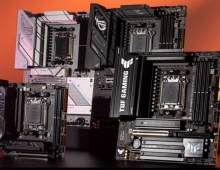
Intel Sees Significant Changes in The PC Market Next Year
Although Intel did not deliver more advanced microprocessors this year and has had difficulty living up to Moore's Law, the company's senior vice president of PC chip business sees majot changes coming to the PC in 2015.
Speaking at a California event hosted by the company's venture capital, Kirk Skaugen outlined Intel's focus in new user interfaces, wireless communications and a password-free computer.
Skaugen showed radio-based technologies such as the wireless docking concept, which can be used at the underside of a table to charge a laptop placed on the table and send a charging signal through two inches of wood, without needing to position the laptopo precisely as other wireless charging technologies.
With woreless display, a computer's screen can be mirrored on a desktop display without the need to plug in anything.
These functions will be supported by PCs and tablets based on a 14nm next-generation "Skylake" Intel processor, coming in the second half of next year.
Skaugen also talked about devices that will recognize your voice, fingerprint or face and will automatically power on or allow you to logo on to them without manually entering any password.
Intel plans to become the number-one 3-D camera manufacturer, Skaugen said, refering to face-recognition capabilities and camera technologies that generate three-dimensional models.
On the other hand, Intel failed to begin volume production of its latest manufacturing process in late 2013, as it had originally scheduled. PCs using the new 14-nanometer production process were to follow in the first or second quarter of 2014.
Only one Broadwell product -- the initial chip line manufactured using the new process -- currently is available in retail stores and four online, with between seven and 10 expected by year end, Intel says.
Skaugen showed radio-based technologies such as the wireless docking concept, which can be used at the underside of a table to charge a laptop placed on the table and send a charging signal through two inches of wood, without needing to position the laptopo precisely as other wireless charging technologies.
With woreless display, a computer's screen can be mirrored on a desktop display without the need to plug in anything.
These functions will be supported by PCs and tablets based on a 14nm next-generation "Skylake" Intel processor, coming in the second half of next year.
Skaugen also talked about devices that will recognize your voice, fingerprint or face and will automatically power on or allow you to logo on to them without manually entering any password.
Intel plans to become the number-one 3-D camera manufacturer, Skaugen said, refering to face-recognition capabilities and camera technologies that generate three-dimensional models.
On the other hand, Intel failed to begin volume production of its latest manufacturing process in late 2013, as it had originally scheduled. PCs using the new 14-nanometer production process were to follow in the first or second quarter of 2014.
Only one Broadwell product -- the initial chip line manufactured using the new process -- currently is available in retail stores and four online, with between seven and 10 expected by year end, Intel says.





















